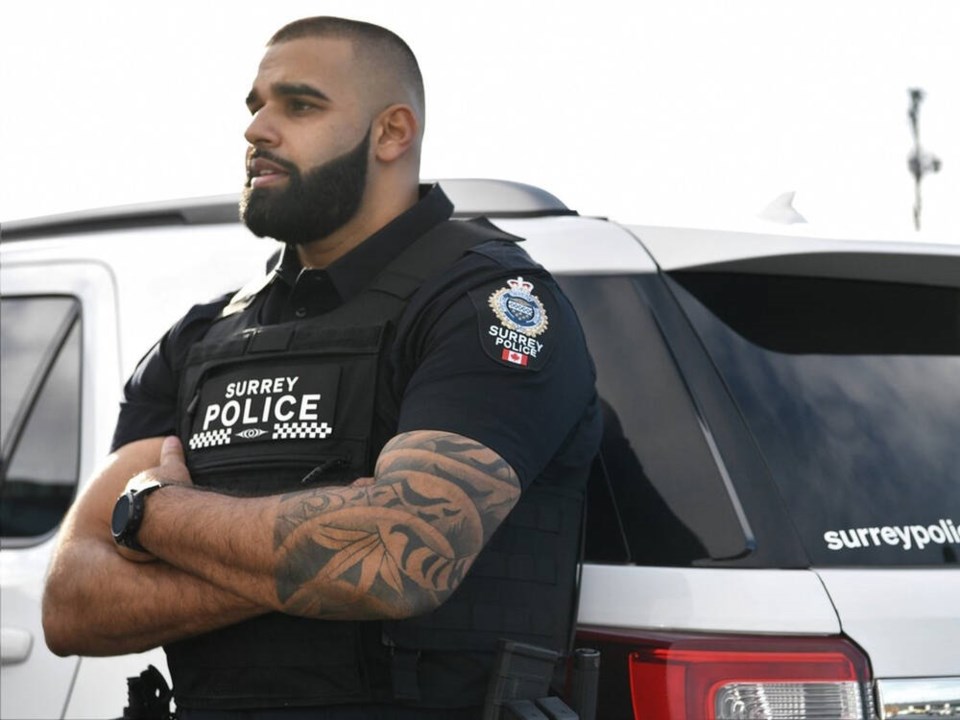VANCOUVER — B.C. Lions alumni Jas Dhillon and Matt Clarke work opposite shifts, but the former football players are teammates again as members of Surrey’s municipal police force.
“It’s a point of pride to be in Surrey,” said Dhillon, an offensive lineman who played for the Lions in 2016 and 2017 before becoming a police officer. “It felt like coming home.”
The two officers spoke to Postmedia recently about their reasons for joining Surrey Police Service and some of the uncertainty facing the department.
The Lions have strong ties to the Surrey community, with their practice facility in Whalley.
For both Dhillon and Clarke, a linebacker who played for the Canadian Football League club from 1991 to 1995, joining SPS felt like a way to give back to a community that had an impact on them.
“I feel very lucky to be here,” said Clarke. “It’s a dynamic, growing city.”
Clarke played football at the University of B.C. before joining the Lions. He won a Grey Cup championship with the team in 1994.
When his football career ended, Clarke applied to the Vancouver Police Department, where he worked in various roles over 26 years.
“I got to experience a lot of different things,” he said. “But I knew I wanted to go back to uniform before I was done.”
That chance presented itself when SPS began recruiting officers. Clarke was hired as a frontline supervisor.
“The opportunity to work with young police officers and … build a police department from the ground up was irresistible,” he said.
Clarke said policing is “natural fit” for people who enjoy being on a team. “People are counting on you and supporting you.”
Dhillon was born and raised in Newton, but went to high school in Delta because his school didn’t have a football team at the time. He played university football, including at UBC, and was drafted in 2014 by the CFL’s Toronto Argonauts. He later signed with his home-province Lions.
While Dhillon was playing football, he was already considering a career in policing. In 2018, Delta Police offered him a job. In 2021, he joined SPS as part of the first 50 officers hired.
“All I know is in Surrey,” he said. “My family, friends. But I wasn’t ready to apply with the Mounties.”
Dhillon called the opportunity to join SPS “once in a lifetime.”
“I think it’s different when you’re policing your own city. There’s pride and the desire to give back to the community where I grew up and played football,” he said.
While he’s currently on general duty patrol, Dhillon hopes to transfer to gang prevention in the future.
“Growing up in Newton, I know it’s easy to get distracted. Some of the people I grew up with are dead or in jail,” he said.
Dhillon said the uncertainty over the police transition is hard on all officers, SPS and RCMP alike.
“There’s nothing we can do but wait,” he said. “We all know that this decision is being made above our pay grade.”
Surrey council, led by Mayor Brenda Locke, recently voted to halt the transition to a municipal force and retain the RCMP. Locke and her Surrey Connect party campaigned on a promise to reverse former mayor Doug McCallum’s decision to create a municipal police force.
The transition is already in progress with 375 people hired, although RCMP remains in charge of policing.
The B.C. government will have the final say on whether council can stop the transition and disband SPS. Public Safety Minister Mike Farnworth has said he’ll make a decision early in the new year with public safety expected to be a significant factor.
Clarke said he isn’t focused on the politics surrounding the police transition.
Periods of uncertainty are not uncommon in policing, as established forces sometimes change direction and leadership, he said. “It’s not that foreign after a career in police work.”
“If you enjoy the work and the connection to the people you work with, all that uncertainty doesn’t need to bother you,” he added.
Clarke remembers a time in the early 1990s when the B.C. Lions couldn’t afford the payroll.
“The great thing in policing is that the cheques don’t bounce,” he joked. “But seriously, it’s a real privilege to serve this community.”



